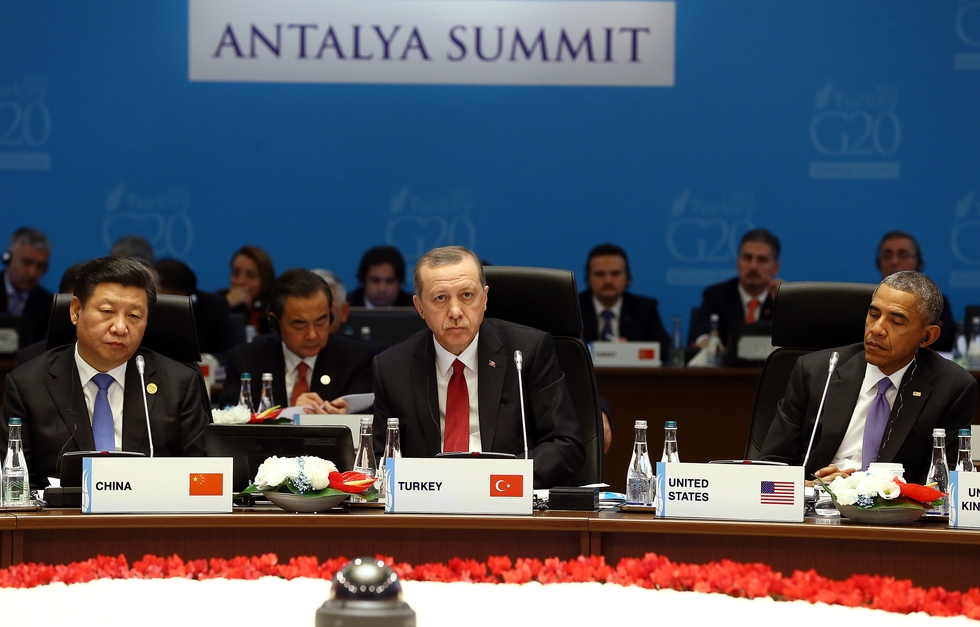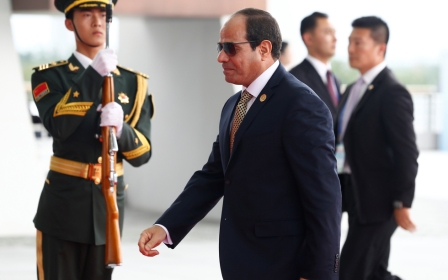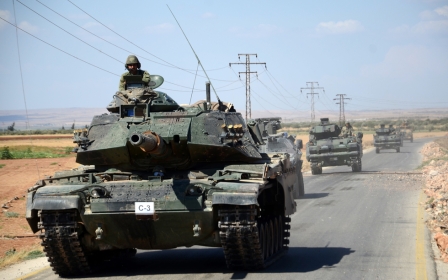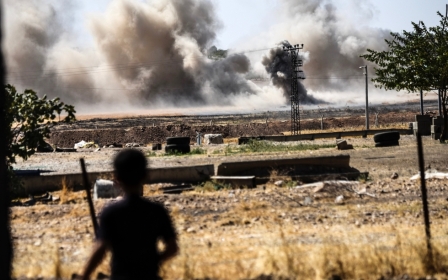Turkey 'ready' to join US forces in attack on Syria's Raqqa

ISTANBUL, Turkey - Turkish President Recep Tayyip Erdogan said on Wednesday that Ankara is open to the idea of conducting a joint military operation with the US to free the Islamic State group’s stronghold of Raqqa.
Erdogan also said Turkish troops will remain actively present in the region for the foreseeable future after launching their first incursion inside Syria.
He told a group of journalists accompanying him on his flight back from the G20 Summit in China that his US counterpart, Barack Obama, is looking for joint action with Turkey inside Syria, and that Ankara is happy to oblige.
“Obama wants us to do something together about Raqqa in particular," he said, referring to the northern Syrian town that is considered IS's headquarters in the country.
"We told him there wouldn’t be a problem on our part. Let our soldiers get together and they can do whatever is necessary,” Erdogan told reporters.
He also said Turkey must have a strong presence in both Syria and Iraq to prevent various groups such as IS, and the Kurdish PYD, the YPG and the PKK from establishing a foothold in the region. He also pointed to Mosul, IS's stronghold in Iraq, as a major centre where action needs to be taken.
Ankara sees the Democratic Union Party (PYD) and its armed wing the People’s Protection Units (YPG) as the Syrian wing of the Kurdistan Workers’ Party (PKK), which Turkey lists as a terrorist organisation.
The US and EU also list the PKK as a terrorist organisation, but the US sees the PYD and YPG as its main allies on the ground against IS.
Erdogan’s remarks came as a surprise since Turkey’s desire to implement a no-fly zone over northern Syria was rejected by the US on Tuesday.
“We do not think a no-fly zone would resolve the fundamental issues on the ground because there continues to be fighting on the ground,” Ben Rhodes, Obama’s national security adviser, told reporters in Laos.
“A no-fly zone would necessarily only be contained to one specific area, and we have problems and violence across the country,” he added.
The US supported Turkey’s Euphrates Shield operation, launched on 24 August to free the Syrian town of Jarabulus from IS control, but concerns arose when Ankara-backed Free Syrian Army rebels and Turkish tanks risked clashes with Washington-backed YPG forces south of Jarabulus on the way to Manbij.
Troops in Syria for foreseeable future
Turkey has put no time limit on its current incursion into Syria, and has not indicated how deep into Syria its troops might go.
US-led coalition aircraft provided air cover for Ankara-backed rebel fighters and Turkish armour for operations to free Jarabulus but refused to do so for any action south of Jarabulus.
Commentators believe a major reason behind Ankara’s decision to put boots on the ground in Syria was the prospect of a PYD-controlled corridor along its southern border that would eventually lead to the establishment of a Kurdish statelet in northern Syria.
Huseyin Bagci, a professor of international relations at Ankara’s Middle East Technical University, told Middle East Eye that Ankara’s recent moves reflect a policy change that has, once again, made it indispensible to both the US and Russia.
“After Turkey sent its forces into Syria it signalled a change from any previous policy errors and has now become an indispensible actor in the fight against IS for both the US and Russia,” said Bagci.
Bagci said Erdogan wants to send a message to the US that Washington no longer needs the YPG to fight IS. “Ankara in no way can accept a PKK-PYD led entity in the region," he said. "Now it can send a message to the Americans that they don’t need to rely on them when the Turkish military, a NATO ally, is ready.”
New MEE newsletter: Jerusalem Dispatch
Sign up to get the latest insights and analysis on Israel-Palestine, alongside Turkey Unpacked and other MEE newsletters
Middle East Eye delivers independent and unrivalled coverage and analysis of the Middle East, North Africa and beyond. To learn more about republishing this content and the associated fees, please fill out this form. More about MEE can be found here.




